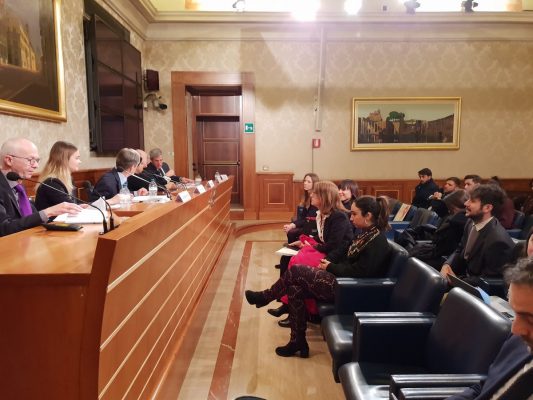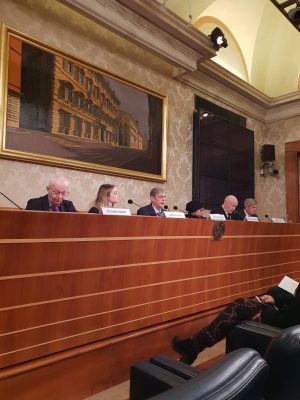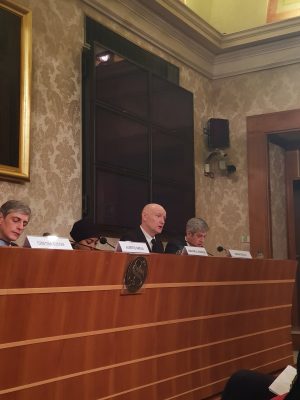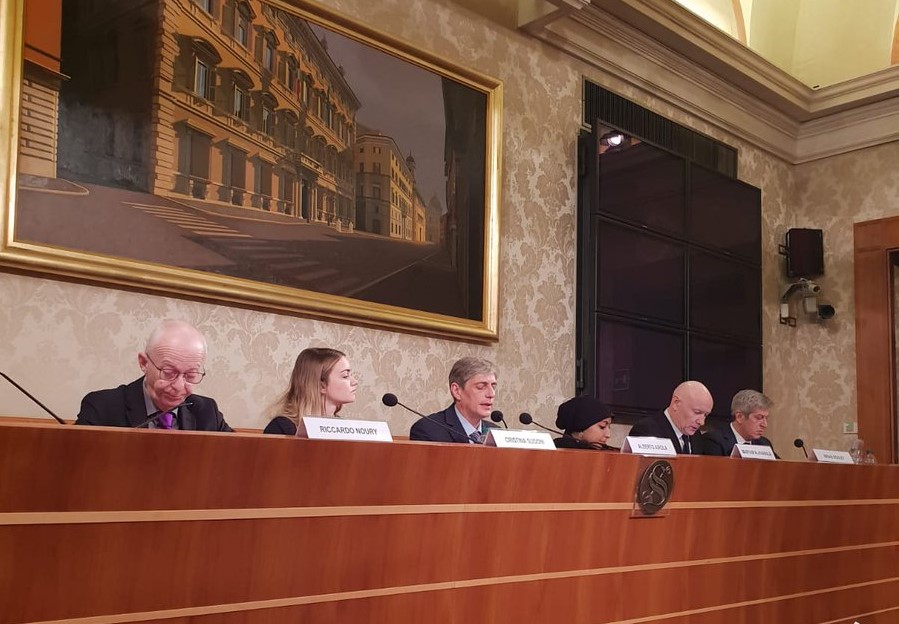Speakers:
Maryam Al-Khawaja, leading human rights activist/GCHR
Cristina Sugoni, ADHRB
Riccardo Noury, Amnesty International
Brian Dooley, Human Rights First
Moderating and hosting the event: Senator Alberto Airola
Find the Italian translation of the event summary here.
Senator Alberto Airola opened the event by stating that it is clear that in the current geopolitical landscape, Bahrain could be forgotten because of the many existing serious situations. However, it is right to give proper space to address the situation in each country, especially when it comes to the less-known. Bahrain is a small State in the Persian Gulf and it is important strategically. The Senator remarked that it is possible to witness a systematic violation of human rights in the country and that this conference is hosted by the Senate’s Foreign Affairs Commission with the scope of fully analyzing the international scenario. Finally, the Senator maintained the importance of the event and what was its aim: that of asking the Italian Ministry of Foreign Affairs, the Italian government and the Italian Embassy in Manama to adopt a different behavior with respect to Bahrain and put pressure on the country in order to establish a democratic system. A first step to do so is by bringing attention to the issue.
Maryam Al-Khawaja, leading human rights activist, delineated a first picture of the situation in Bahrain, highlighting that today marked 8 years since the starting of the uprising in Bahrain. She then continued saying that Bahrain is a country ruled by a monarchy and uprisings in the country take place about every ten years since the 1920s. Bahrain took part in the broader movement of the Arab springs of 2011. The requests made by the population are always the same: reforms, human rights, and representation. If one looked at BCC’s recorded interviews with activists from the 1950s, one could confirm that the requests made back then were the same as those made in 2011.
Similar to other countries where there are dictators, the Bahraini government responded to the protests with violence. However, Al-Khawaja pointed out at two main differences. The first, little known about Bahrain, is that the uprising that took place there was among the largest – on a per capita basis – during the Arab springs. The second, that the Saudi government sent its troops to help the government to put down peaceful protests demanding human rights and democracy. This intervention, however, did not raise the concerns of the international community, differently from what happened, for instance, when Russia was engaged in Ukraine. In that case, indeed, there was international outrage and even the reaction from the United States. The same should have happened for Bahrain and the Saudi intervention.
Al-Khawaja then analyzed more in depth the situation, highlighting the extrajudicial killings that took place as a retaliation against peaceful protests, including the people killed because of torture while in prison. She also stated that there are currently 4.000 political prisoners in Bahrain, on a population of about 700.000 people, which means there is barely any family left in Bahrain’s Shia community to not have a relative in prison. In Al-Khawaja’s own family she herself was in prison, her sister was, her father (who continues to be jailed), her brother-in-law, and her cousins. Unfortunately, her family is not an exception but the norm in the country.
Citing Human Rights Watch, Al-Khawaja then affirmed that in Bahrain there is not a non-functioning judiciary but an injustice system perfectly functioning. However, there is a difference between the initial government’s reaction and what is currently going on in the country. There has been a progressive institutionalization of the repression through the judicial system. The government uses the judicial system to routinely suppress opposition.
Al-Khawaja also pointed that it is important to note that what happens in Bahrain does not stop at its borders. Bahrain comes as a package with the countries of the Gulf Cooperation Council. The same things happen in other countries like Saudi Arabia (see the Khashoggi case) and the reaction from the international community is almost non-existent. This is why she then asked: if in that circumstance there was not an appropriate reaction, how can we expect to see a reaction about Bahrain?
Finally, Al-Khawaja pointed to the question of special treatment and enjoyment of immunity at the international level when it comes to crimes and human rights violations committed by Gulf States. Are the Gulf States treated differently? Is it because they have oil that they can get away with the violations they commit? Does this mean that these countries can escape accountability? She remarked that in Europe we have a commitment to safeguard human rights defenders, but right now there are three EU citizens imprisoned and subjected to systematic torture in Bahrain and yet the EU has failed in securing their release and their return to Europe. She continued by saying: imagine if these same prisoners were imprisoned in Iran. There would have been international outrage. If we cannot even protect EU citizens, what can we do for the thousands of people in Bahrain that are non-European and completely unknown?
She then concluded with a very interesting question: If we uphold democracy as the most important value in EU, we really must ask if we just uphold it for our enemies or also for our “friends”. This is exactly the important question when it comes to democracy: being able to uphold it in every circumstances, even with our allies.
Senator Laura Bottici (address on behalf of the Senate’s President Senator Casellati) addressed the speakers and the audience on behalf of the Senate’s President. The Senator thanked the speakers for the possibility they were providing her and members of the Senate to listen to their testimonies. She remarked that there are some issues that are usually not addressed and that not many people are familiar with, therefore being able to speak about them within the Senate of the Republic was an important way to raise awareness. The Senator added that, all human rights organizations should have more opportunities and that through her experience in these years, she was able to understand the importance of relations with foreign countries. Finally, the Senator remarked that she was glad to attend the event, to be able to listen, learn, and try to help, and that unless all people cooperate as human beings – beyond state and partisan differences – it will not be possible to improve. Therefore, events on the human rights of every country in the world are more than welcome.
 Cristina Sugoni spoke on the lack of political space for the opposition in Bahrain. Indeed, the electoral system in Bahrain has always prevented the majority of the population from being effectively represented because of the phenomenon of gerrymandering. Through this practice, government districts have more weight than opposition districts. If we look at the data on the 2010 elections, the major opposition party gained 64% of votes, but only 18 seats out of the 40 available. In the following elections, because of gerrymandering, the opposition did not run and boycotted the process. The government, instead of trying to understand the reasons that led the opposition to this choice, enacted even more repressive policies. In 2016, Al-Wefaq, the major opposition party, was disbanded and accused of supporting and having links with terrorism. The only independent newspaper was closed in 2017. In May 2018 an amendment was approved prohibiting anyone who had previously been a member of an opposition party or who had been jailed for 6 months from running for a public office. The majority of the population, therefore, was excluded from the democratic process. Al Wefaq’s leader, Ali Salman, who was already sentenced in 2014, in November 2017 was accused of espionage in favor of Qatar (right before the elections, and when his previous sentence was ending). However, in 2011 Qatar had been nominated as the mediator between the government and the opposition. Therefore, all communications taking place with the country were legitimate and approved also by the international community, including by the United States. Salman, despite the appeals, was sentenced to life prison. The PPO, indeed, managed to overturn the decision of the Supreme Court which had declared Salman innocent.
Cristina Sugoni spoke on the lack of political space for the opposition in Bahrain. Indeed, the electoral system in Bahrain has always prevented the majority of the population from being effectively represented because of the phenomenon of gerrymandering. Through this practice, government districts have more weight than opposition districts. If we look at the data on the 2010 elections, the major opposition party gained 64% of votes, but only 18 seats out of the 40 available. In the following elections, because of gerrymandering, the opposition did not run and boycotted the process. The government, instead of trying to understand the reasons that led the opposition to this choice, enacted even more repressive policies. In 2016, Al-Wefaq, the major opposition party, was disbanded and accused of supporting and having links with terrorism. The only independent newspaper was closed in 2017. In May 2018 an amendment was approved prohibiting anyone who had previously been a member of an opposition party or who had been jailed for 6 months from running for a public office. The majority of the population, therefore, was excluded from the democratic process. Al Wefaq’s leader, Ali Salman, who was already sentenced in 2014, in November 2017 was accused of espionage in favor of Qatar (right before the elections, and when his previous sentence was ending). However, in 2011 Qatar had been nominated as the mediator between the government and the opposition. Therefore, all communications taking place with the country were legitimate and approved also by the international community, including by the United States. Salman, despite the appeals, was sentenced to life prison. The PPO, indeed, managed to overturn the decision of the Supreme Court which had declared Salman innocent.
Sugoni concluded her remarks with some requests for the Italian parliament. First, to act as to solicit international pressure. Second, an appeal was made concerning the role of the Italian embassy in Manama. The Italian Embassy, indeed, has never allowed meetings with human rights activists or opposition leaders, nor it has participated in Nabeel Rajab and Ali Salman’s trials. This last thing, in particular, could have been a signal of support to them but also a signal from Italy about it being aware of the situation in Bahrain. Letters sent by international NGOs have never received an answer. Instead, the Embassy has always showed openness in its relations with the Bahraini government. Of course this is part of its mandate, but as a democratic country Italy should take a stance in these circumstances. Acknowledging what happens in Bahrain and opening the Italian Embassy to the instances of human rights defenders and opposition leaders could be a first step for the country. This could be an important step to have Bahrain understand that Italy is a democratic country which recognizes and defends human rights.
Riccardo Noury stated that he was glad to be able to talk about this country, unknown to most part of the population and about which in Italy we only hear during the Grand Prix. He then cited Physicians for Human Rights’ data: Bahrain was the country with the highest record of teargases used against the population. Noury’s intervention focused on the lack of freedom of expression in the country and delineated the picture of the existing violations. In Bahrain, the majority of the opposition is in prison, it is impossible to establish opposition parties, and practices like the arbitrary removal of citizenship are the norm. Torture is widely documented but victims are prevented from having access to medical care. The judiciary reinforces this system of oppression. Military tribunals can trial civilians (which is something prohibited under international law). Anyone criticizing Saudi Arabia’s intervention in the war in Yemen is accused of insulting a friend country. Anyone criticizing the government is accused of offending the State. Noury also added that Bahrain is covered by the United States and the United Kingdom and that it engages in a variety of public relations in order to conceal what happens in the country. Noury finally addressed the case of the university course established at the University of Rome La Sapienza, dedicated to peaceful dialogue among religions and entitled to the King of Bahrain. He defined this case “a marvelous example of Orwellian literature” and affirmed that, if we cannot stop the traffic in weapons, if the Italian Embassy cannot take a position, at least, we could try a small but important step in addressing this case. He concluded encouraging the Senate to address the issue.
Senator Alberto Airola committed himself to personally take care of this specific case.
Brian Dooley, Human Rights First highlighted the role that Italy can have in asking Bahrain accountability for the human rights violations taking place in the country. Indeed, he affirmed that he believes that the Italian government and parliament can really have an impact on Bahrain. Italy, indeed, is one of the only five western countries to have an embassy in the country. The Embassy in Bahrain really matters and can have an impact. The Embassy, he said, if there to represent Italy and not just to have relations with the corrupt government; it is there also to have relations with the civil society.

According to Dooley, the Italian Embassy should provide a safe space for activists and signal that its relationship with Bahrain is not confined to the government but also open to the civil society. Requests to see civil society individuals in prison, though they are unlikely to be accepted, are worth trying. During trials the representatives from Italy should not just sit and take notes but point at possible irregularities. Dooley said that trials in Bahrain are usually a fraud: detainees cannot use the medical records to prove that they have been subjected to torture and attorneys cannot have access to the proofs. Italy should point out this. Members of the Italian parliament should remark that Bahraini MPs are not seen as peers and should refuse to meet them because of the fraud in the elections. Italian MPs could also ask to go to Bahrain to meet political prisoners. Probably they will not even let them outside of the airport, but the case of foreign MPs stopped and prevented from exiting an airport could bring international attention to the situation in Bahrain. He concluded affirming that even if MPs do not get permission to enter, they should show up. Even just doing that is important because it creates attention and reassures prisoners in Bahrain that someone is taking care of their situation. For instance, when Dooley and other activists tried to have access to Abdulhadi Al-Khawaja they did not succeed and had to fly back to Washington. However, that case, created international attention. Another thing Dooley suggested to the MPs is adopting a motion condemning the human rights violations taking place and, finally, tweeting pictures (which might seem something small but it is really not) of Embassy’s representatives not only with government officials, but also with human rights activists and opposition leaders.
Yannick Cocard focused mainly on the role of the Italian Embassy in Manama. Indeed, Cocard affirmed that, while other European embassies like the French Embassy and the German Embassy are more active and, in the past, have publicly condemned Bahrain’s repression (exception made for the UK, probably due to historical reasons), Italy, which is Bahrain’s first European commercial partner, has not in any circumstance expressed concerns over the ongoing human rights violations in the country. Lately, Cocard added, the French ambassador, then flanked by the Foreign Affairs Minister, publicly criticized Nabeel Rajab’s (which had also been nominated French honorary citizen) prison sentence, after France and Germany had already expressed their concerns on the matter. In conclusion, on behalf of ADHRB, Cocard encouraged the Italian government to provide more support to the action of human rights activists and also to publicly criticize Bahrain’s repressive action. Moreover, he also praised the yearly commitment of the European Parliament in fighting for the release of political prisoners in Bahrain. An example of such commitment is the case of the release of Maryam Al-Khawaja.
Claudia Carnevale provided a brief statement referring to the already-mentioned case at the University of Rome La Sapienza. She affirmed that the university should be a place devoted to free dialogue, expression, and thought. However, the decision to entitle the chair of a course dedicated to peaceful dialogue and coexistence among religions to the head of State of a country that in reality acts contrary to these principles seems to completely ignore what happens in Bahrain. Therefore, Carnevale encouraged again the Senate on behalf of ADHRB to investigate the issue and act on it.
Senator Alberto Airola committed again to taking care personally of this issue, considering the case shameful.






